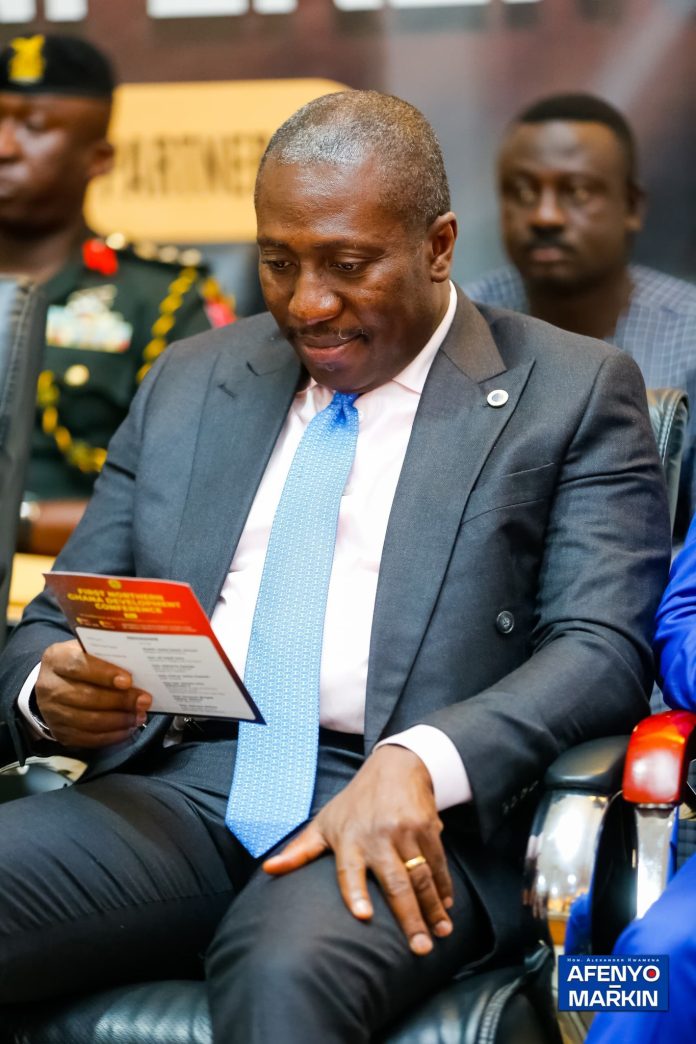An attempt to oust Minority Leader, Osahen Alexander Afenyo-Markin from Ghana’s delegation to the ECOWAS Parliament has dramatically failed, following strong objections from his deputy, institutional resistance from the ECOWAS Parliament and the revelation of an internal agreement safeguarding roles within the leadership.
The drama began on Tuesday, July 22, 2025 when Parliament passed a resolution reconstituting the country’s delegation to the ECOWAS Parliament.
The motion, moved by Majority Leader Mahama Ayariga, removed Afenyo-Markin’s name from the delegation and replaced him with his Deputy Minority Leader, Patricia Appiagyei, despite the absence of both leaders on the day of the vote.
What appeared on the surface as a routine reshuffling of roles soon erupted into a high-stakes leadership struggle involving legal frameworks, political betrayal and questions over greed and loyalty.
The timing, secrecy and execution of the attempted replacement raised eyebrows within and outside Parliament, especially given Afenyo-Markin’s stature as Third Deputy Speaker of the ECOWAS Parliament, a position he was elected to in May 2024.
The attempt to justify the Minority Leader’s removal was spearheaded by former Minority Chief Whip, Mohammed Muntaka Mubarak, who accused Afenyo-Markin of greed.
According to Mohammed Muntaka, the Minority Leader already occupied high-profile international positions including representation at the Inter-Parliamentary Union (IPU) and the Commonwealth Parliamentary Association (CPA) and was now clinging onto ECOWAS despite the opportunity to allow another leader, namely Patricia Appiagyei, to gain similar exposure.
“You cannot hold on to all international roles. That is not leadership. That is greed,” Muntaka reportedly said. But this narrative crumbled under scrutiny. Official documents and internal communications revealed that Afenyo-Markin had already relinquished his positions at the IPU and CPA to Patricia Appiagyei, in a move aimed at empowering her to represent the Minority across multiple platforms.
In return, he remained on the ECOWAS Parliament, not only as a member, but as an elected Deputy Speaker, a role that comes with legal protections under the Supplementary Act A/SA.1/12/16 of ECOWAS.
Deputy Minority Leader withdraws
Shortly after the resolution was passed, Patricia Appiagyei popularly known as Mama Pat sent a strongly-worded memorandum dated July 22 to the Speaker of Parliament, distancing herself from the plot and rejecting her supposed appointment to the ECOWAS Parliament.
“I was not consulted about this replacement. At no point did I express interest in replacing my leader,” she wrote.
The Deputy Minority Leader further described the resolution as a calculated move to sow discord between herself and Afenyo-Markin, insisting that she had no intention of undermining him.
In the same memo, she reminded the Speaker and Parliament that Afenyo-Markin’s position at the ECOWAS Parliament is protected by law, and his four-year tenure as a Member following his swearing-in and election as Deputy Speaker could not be summarily revoked without violating ECOWAS statutes.
Two days later, on July 24, Patricia Appiagyei followed up with another official communication. This time, she explicitly reaffirmed her representation of the Minority at the IPU and CPA, as earlier agreed upon with Afenyo-Markin.
She further nominated Shirley Kyei (Atwima Nwabiagya South) for the IPU and Ida Adwoa Asiedu (Ayensuano) for the CPA, ensuring full Minority presence on those global platforms.
This memo dealt a second blow to efforts aimed at removing Afenyo-Markin, showing that there was no internal leadership dispute and that the narrative of greed was misplaced.
ECOWAS Act
At the heart of the failed ouster lies the Supplementary Act A/SA.1/12/16 which governs the structure and functioning of the ECOWAS Parliament.
According to Article 18(2) of the Act, Members of the ECOWAS Parliament are elected for a non-renewable four-year term, and cannot be removed arbitrarily by domestic political arrangements.
The law is clear: a Member may only be replaced if they resign voluntarily, die, become incapacitated, bring disrepute to ECOWAS, or develop a conflict of interest that violates ECOWAS obligations. Political realignments or party decisions in the member state do not constitute valid grounds for recall.
Therefore, Afenyo-Markin’s continued membership is not only justified by his election and performance, but guaranteed by international law.
ECOWAS Parliament
This is not the first time ECOWAS has blocked internal attempts to recall members over partisan politics. In March 2025, the ECOWAS Parliament rejected a move by Liberia’s government to withdraw three of its legislators, citing that the internal political crisis in Liberia could not override ECOWAS statutes.
Similarly, in Guinea-Bissau, ECOWAS dismissed efforts to remove a sitting member who was facing trial, stating that the charges had not reached a level sufficient to justify such action under the Act.
Per the Terms and Conditions governing the tenure and replacement of a Member of the ECOWAS Parliament, as stated in the Supplementary Act A/SA.1/12/16 relating to the Enhancement of the Powers of the ECOWAS Parliament, the tenure of Members of Parliament (MPs), including the Speaker and Deputy Speakers, is firmly anchored in law and not subject to arbitrary political decisions by individual Member States.
Article 18 (2) of the Supplementary Act clearly states that Members of the ECOWAS Parliament shall be elected for four (4) years from the date of the inauguration of the ECOWAS Parliament. This mandate shall last until the last day of the legislature.
This fixed term is protected and cannot be interrupted arbitrarily by national authorities. Once a Member is duly elected and sworn in, their mandate is independent of national political changes or internal reassignments.
Based on Articles 24 and 25 of the Supplementary Act, the tenure of the Speaker and Deputy Speakers shall be for the life of the Legislature.










